- Home
- Jacob Grimm
The Original Folk and Fairy Tales of the Brothers Grimm
The Original Folk and Fairy Tales of the Brothers Grimm Read online
THE ORIGINAL FOLK AND FAIRY TALES OF THE BROTHERS GRIMM
THE COMPLETE FIRST EDITION
The Original Folk & Fairy Tales OF THE BROTHERS GRIMM
TRANSLATED & EDITED BY
JACK ZIPES
ILLUSTRATED BY
ANDREA DEZSÖ
JACOB AND WILHELM GRIMM
PRINCETON UNIVERSITY PRESS
Princeton and Oxford
Copyright © 2014 by Princeton University Press
Illustrations copyright © Andrea Dezsö 2014
Published by Princeton University Press, 41 William Street, Princeton, New Jersey 08540
In the United Kingdom: Princeton University Press, 6 Oxford Street, Woodstock, Oxfordshire OX20 1TW
press.princeton.edu
Jacket illustration and design © Andrea Dezsö.
All Rights Reserved
Library of Congress Cataloging-in-Publication Data
Grimm, Jacob, 1785–1863.
[Kinder- und Hausmärchen. English. 2015]
The Original Folk and Fairy Tales of the Brothers Grimm : the Complete First Edition / [Jacob Grimm, Wilhelm Grimm ; translated by] Jack Zipes ; [illustrated by Andrea Dezsö].
pages cm
Includes bibliographical references and index.
ISBN 978-0-691-16059-7 (hardback : acid-free paper) 1. Fairy tales—Germany. 2. Tales—Germany. 3. Folklore—Germany. I. Grimm, Wilhelm, 1786–1859. II. Zipes, Jack, 1937–III. Dezsö, Andrea. IV. Title.
GR166.G54313 2015
398.20943—dc23
2014004127
British Library Cataloging-in-Publication Data is available
This book has been composed in Garamond Premier Pro
Printed on acid-free paper. ∞
Printed in Canada
10 9 8 7 6 5 4 3 2 1
For Bianca Lazzaro and Carmine Donzelli, whose friendship has sparked my life and my interest in folk and fairy tales
CONTENTS
List of Figures xv
Acknowledgments xvii
Introduction: Rediscovering the Original Tales of the Brothers Grimm xix
Note on the Text and Translation xlv
VOLUME I
PREFACE TO VOLUME I 3
1. The Frog King, or Iron Henry (Der Froschkönig oder der eiserne Heinrich) 13
2. The Companionship of the Cat and Mouse (Katz und Maus in Gesellschaft) 16
3. The Virgin Mary’s Child (Marienkind) 17
4. Good Bowling and Card Playing (Gut Kegel- und Kartenspiel) 21
5. The Wolf and the Seven Kids (Der Wolf und die sieben jungen Geißlein) 23
6. The Nightingale and the Blindworm (Von der Nachtigall und der Blindschleiche) 25
7. The Stolen Pennies (Von dem gestohlenen Heller) 26
8. The Hand with the Knife (Die Hand mit dem Messer) 26
9. The Twelve Brothers (Die zwölf Brüder) 27
10. Riffraff (Das Lumpengesindel) 32
11. Little Brother and Little Sister (Brüderchen und Schwesterchen) 34
12. Rapunzel (Rapunzel) 37
13. The Three Little Men in the Forest (Die drei Männlein im Walde) 40
14. Nasty Flax Spinning (Von dem bösen Flachsspinnen) 42
15. Hansel and Gretel (Hänsel und Gretel) 43
16. Herr Fix-It-Up (Herr Fix und Fertig) 49
17. The White Snake (Die weiße Schlange) 53
18. The Journey of the Straw, the Coal, and the Bean (Strohhalm, Kohle und Bohne auf der Reise) 55
19. The Fisherman and His Wife (Von den Fischer und siine Fru) 56
20. A Story about a Brave Tailor (Von einem tapfern Schneider) 62
21. Cinderella (Aschenputtel) 69
22. How Some Children Played at Slaughtering (Wie Kinder Schlachtens mit einander gespielt haben) 77
23. The Little Mouse, the Little Bird, and the Sausage (Von dem Mäuschen, Vögelchen und der Bratwurst) 79
24. Mother Holle (Frau Holle) 81
25. The Three Ravens (Die drei Raben) 83
26. Little Red Cap (Rothkäppchen) 85
27. Death and the Goose Boy (Der Tod und der Gänshirt) 88
28. The Singing Bone (Der singende Knochen) 89
29. The Devil with the Three Golden Hairs (Von dem Teufel mit drei goldenen Haaren) 92
30. Little Louse and Little Flea (Läuschen und Flöhchen) 97
31. Maiden without Hands (Mädchen ohne Hände) 99
32. Clever Hans (Der gescheidte Hans) 103
33. Puss in Boots (Der gestiefelte Kater) 110
34. Hans’s Trina (Hansens Trine) 115
35. The Sparrow and His Four Children (Der Sperling und seine vier Kinder) 116
36. The Little Magic Table, the Golden Donkey, and the Club in the Sack (Von dem Tischgen deck dich, dem Goldesel und dem Knüppel in dem Sack) 119
37. The Tablecloth, the Knapsack, the Cannon Hat, and the Horn (Von der Serviette, dem Tornister, dem Kanonenhütlein und dem Horn) 126
38. Mrs. Fox (Von der Frau Füchsin) 129
39. The Elves (Von den Wichtelmännern) 132
About the Shoemaker for Whom They Did the Work (Von dem Schuster, dem sie die Arbeit gemacht) 132
About a Servant Girl Who Acted as Godmother (Von einem Dienstmädchen, das Gevatter bei ihnen gestanden) 133
About a Woman Whose Child They Had Exchanged (Von einer Frau, der sie das Kind vertauscht haben) 133
40. The Robber Bridegroom (Der Räuberbräutigam) 135
41. Herr Korbes (Herr Korbes) 137
42. The Godfather (Der Herr Gevatter) 138
43. The Strange Feast (Die wunderliche Gasterei) 141
44. Godfather Death (Der Gevatter Tod) 142
45. The Wandering of Thumbling, the Tailor’s Son (Des Schneiders Daumerling Wanderschaft) 143
46. Fitcher’s Bird (Fitchers Vogel) 146
47. The Juniper Tree (Van den Machandel-Boom) 148
48. Old Sultan (Der alte Sultan) 158
49. The Six Swans (Die sechs Schwäne) 159
50. Briar Rose (Dornröschen) 162
51. The Foundling (Vom Fundevogel) 165
52. King Thrushbeard (König Droßelbart) 167
53. Little Snow White (Sneewittchen [Schneeweißchen]) 170
54. Simple Hans (Hans Dumm) 178
55. Rumpelstiltskin (Rumpelstilzchen) 181
56. Sweetheart Roland (Der liebste Roland) 182
57. The Golden Bird (Vom goldenen Vogel) 185
58. Loyal Godfather Sparrow (Vom treuen Gevatter Sperling) 191
59. Prince Swan (Prinz Schwan) 194
60. The Golden Egg (Das Goldei) 197
61. The Tailor Who Soon Became Rich (Von dem Schneider, der bald reich wurde) 199
62. Bluebeard (Blaubart) 202
63. The Golden Children (Goldkinder) 205
64. The Simpleton (Von dem Dummling) 207
The White Dove (Die weiße Taube) 207
The Queen Bee (Die Bienenkönigin) 208
The Three Feathers (Die drei Federn) 210
The Golden Goose (Die goldene Gans) 212
65. All Fur (Allerleirauh) 216
66. Hurleburlebutz (Hurleburlebutz) 220
67. The King with the Lion (Der Konig mit dem Löwen) 223
68. The Summer and the Winter Garden (Von dem Sommer- und Wintergarten) 225
69. Jorinda and Joringel (Jorinde und Joringel) 227
70. Okerlo (Der Okerlo) 230
71. Princess Mouseskin (Prinzessin Mäusehaut) 233
72. The Pear Refused to Fall (Das Birnli will nit fallen) 234
73. The Castle of Murder (Das Mordschloß) 236
74. Johannes Wat
erspring and Caspar Waterspring (Von Johannes-Wassersprung und Caspar-Wassersprung) 238
75. The Bird Phoenix (Vogel Phönix) 241
76. The Carnation (Die Nelke) 242
77. The Carpenter and the Turner (Vom Schreiner und Drechsler) 244
78. The Old Grandfather and the Grandson (Der alte Großvater und der Enkel) 245
79. The Water Nixie (Die Wassernix) 246
80. The Death of Little Hen (Von dem Tod des Hühnchens) 246
81. The Blacksmith and the Devil (Der Schmidt und der Teufel) 248
82. The Three Sisters (Die drei Schwestem) 251
83. The Poor Maiden (Das arme Mädchen) 262
84. The Mother-in-Law (Die Schwiegermutter) 263
85. Fragments (Fragmente) 264
Snowflower (Schneeblume) 264
The Princess with the Louse (Prinzessin mit der Laus) 264
Prince Johannes (Vom Prinz Johannes) 265
The Good Cloth (Der gute Lappen) 265
86. The Fox and the Geese (Der Fuchs und die Gänse) 265
VOLUME II
PREFACE TO VOLUME II 269
1. The Poor Man and the Rich Man (Der Arme und der Reiche) 274
2. The Singing, Springing Lark (Das singende, springende Löweneckerchen) 277
3. The Goose Girl (Die Gänsemagd) 283
4. The Young Giant (Von einem jungen Riesen) 289
5. The Gnome (Dat Erdmänneken) 297
6. The King of the Golden Mountain (Der König vom goldenen Berg) 301
7. The Raven (Die Rabe) 307
8. The Clever Farmer’s Daughter (Die kluge Bauemtochter) 313
9. The Genie in the Glass (Der Geist im Glas) 316
10. The Three Little Birds (De drei Vügelkens) 319
11. The Water of Life (Das Wasser des Lebens) 324
12. Doctor Know-It-All (Doctor Allwissend) 329
13. The Frog Prince (Der Froschprinz) 331
14. The Devil’s Sooty Brother (Des Teufels rußiger Bruder) 333
15. The Devil in the Green Coat (Der Teufel Grünrock) 337
16. The Wren and the Bear (Der Zaunkönig und der Bär) 340
17. The Sweet Porridge (Vom süßen Brei) 343
18. The Faithful Animals (Die treuen Thiere) 343
19. Tales about Toads (Mährchen von der Unke) 347
20. The Poor Miller’s Apprentice and the Cat (Der arme Müllerbursch und das Katzchen) 348
21. The Crows (Die Krähen) 351
22. Hans My Hedgehog (Hans mein Igel) 354
23. The Little Shroud (Das Todtenhemdchen) 360
24. The Jew in the Thornbush (Der Jud’ im Dorn) 360
25. The Expert Huntsman (Der gelernte Jäger) 363
26. The Fleshing Flail from Heaven (Der Dresschpflegel vom Himmel) 368
27. The Children of the Two Kings (De beiden Künnigeskinner) 369
28. The Clever Little Tailor (Vom klugen Schneiderlein) 377
29. The Bright Sun Will Bring It to Light (Die klare Sonne bringt’s an den Tag) 380
30. The Blue Light (Das blaue Licht) 383
31. The Stubborn Child (Von einem eigensinnigen Kinde) 386
32. The Three Army Surgeons (Die drei Feldscherer) 386
33. The Lazy One and the Industrious One (Der Faule und der Fleißige) 389
34. The Three Journeymen (Die drei Handwerksburschen) 390
35. The Heavenly Wedding (Die himmlische Hochzeit) 394
36. The Long Nose (Die lange Nase) 395
37. The Old Woman in the Forest (Die Alte im Wald) 401
38. The Three Brothers (Die drei Brüder) 403
39. The Devil and His Grandmother (Der Teufel und seine Großmutter) 405
40. Faithful Ferdinand and Unfaithful Ferdinand (Ferenand getrü und Ferenand ungetrü) 408
41. The Iron Stove (Der Eisen-Ofen) 413
42. The Lazy Spinner (Die faule Spinnerin) 418
43. The Lion and the Frog (Der Löwe und der Frosch) 420
44. The Soldier and the Carpenter (Der Soldat und der Schreiner) 422
45. Pretty Katrinelya and Pif-Paf-Poltree (Die schöne Katrinelje und Pif, Paf, Poltrie) 428
46. The Fox and the Horse (Der Fuchs und das Pferd) 430
47. The Worn-out Dancing Shoes (Die zertanzten Schuhe) 431
48. The Six Servants (Die sechs Diener) 435
49. The White Bride and the Black Bride (Die weiße und schwarze Braut) 440
50. The Wild Man (De wilde Mann) 444
51. The Three Black Princesses (De drei schwatten Princessinnen) 448
52. Knoist and His Three Sons (Knoist un sine dre Sühne) 450
53. The Maiden from Brakel (Dat Mäken von Brakel) 450
54. The Domestic Servants (Das Hausgesinde) 451
55. Little Lamb and Little Fish (Das Lämmchen und Fischchen) 452
56. Sesame Mountain (Simeliberg) 454
57. The Children of Famine (Die Kinder in Hungersnoth) 456
58. The Little Donkey (Das Eselein) 456
59. The Ungrateful Son (Der undankbare Sohn) 461
60. The Turnip (Die Rube) 461
61. The Rejuvenated Little Old Man (Das junggeglühte Männlein) 464
62. The Animals of the Lord and the Devil (Des Herrn und des Teufels Gethier) 466
63. The Beam (Der Hahnenbalken) 467
64. The Old Beggar Woman (Die alte Bettelfrau) 467
65. The Three Lazy Sons (Die drei Faulen) 468
66. Saint Solicitous (Die heilige Frau Kummerniß) 469
67. The Tale about the Land of Cockaigne (Das Märchen vom Schlauaffenland) 469
68. The Tall Tale from Ditmarsh (Das Dietmarsische Lügen-Märchen) 470
69. A Tale with a Riddle (Räthsel-Märchen) 471
70. The Golden Key (Der goldene Schlüssel) 471
List of Contributors and Informants 475
Notes to Volumes I and II 479
Index of Tales 517
FIGURES
FIGURE 1. The Frog King
12
FIGURE 2. The Twelve Brothers
28
FIGURE 3. Herr Fix-It-Up
52
FIGURE 4. How Some Children Played at Slaughtering
78
FIGURE 5. The Singing Bone
90
FIGURE 6. The Elves—About a Woman Whose Child They Had Exchanged
134
FIGURE 7. The Godfather
140
FIGURE 8. Simple Hans
179
FIGURE 9. Loyal Godfather Sparrow
192
FIGURE 10. Okerlo
232
FIGURE 11. The Three Sisters
255
FIGURE 12. The Young Giant
290
FIGURE 13. The Devil in the Green Coat
338
FIGURE 14. Hans My Hedgehog
356
FIGURE 15. The Blue Light
382
FIGURE 16. The Long Nose
398
FIGURE 17. The Soldier and the Carpenter
425
FIGURE 18. The Wild Man
446
FIGURE 19. The Little Donkey
458
FIGURE 20. The Golden Key
472
ACKNOWLEDGMENTS
Over the past forty years or so I had often wondered why nobody had ever translated the first edition of the Grimms’ Kinder- und Hausmärchen (1812/15) into English, and it was not until 2012, the bicentenary of these two volumes, that I decided, if nobody was going to undertake this “task,” I would do it—and do it out of pleasure and to share the unusual tales the Grimms collected as young men when they had not fully realized what a treasure they had uncovered. Their tales are, in fact, a treasure that belongs not only to Germany but also to many other countries in the world.
In sharing this treasure I have been most fortunate to have the understanding of the editorial staff at Princeton University Press, wonderful editors, who have supported my work in the fields of folklore and
fairy-tale studies during the past ten years. So, I want to take this opportunity to thank them all for their assistance. In particular, I want to express my gratitude to the two editors in charge of The Original Folk and Fairy Tales of the Brothers Grimm, namely, Alison MacKeen and Anne Savarese, who shepherded the manuscript through the first stages of approval. Their advice has been invaluable. In addition, there are not words enough to thank Sara Lerner, with whom I have worked on a few occasions. She is one of the most thorough, attentive, and keen production editors I have ever encountered. Jennifer Harris, who copyedited the entire book, improved the manuscript immensely, and I relied greatly on her advice. Maria Lindenfeldar and Jason Alejandro have played key roles in creating the art design for the book and have guided me wisely in selecting the images for the tales. Last but not least, I want to thank Andrea Dezsö for contributing her extraordinary illustrations that reveal many of the hidden meanings of the tales.
INTRODUCTION: REDISCOVERING THE ORIGINAL TALES OF THE BROTHERS GRIMM
JACK ZIPES
Just a little over two hundred years ago, in December of 1812, Jacob and Wilhelm Grimm published the first volume of their Kinder- und Hausmärchen (Children’s and Household Tales), followed by a second volume in 1815. Little did the Grimms realize at that time that their tales would become the most famous “fairy tales” in the world and that the bicentennial of these two extraordinary books would be celebrated in conferences and ceremonies worldwide between 2012 and 2015. Ironically, few people today are familiar with the original tales of the first edition, for the Grimms went on to publish six more editions and made immense changes in them so that the final 1857 edition has relatively little in common with the first edition. From 1812 to 1857 the Brothers deleted numerous tales from the first edition, replaced them with new or different versions, added over fifty tales, withdrew the footnotes and published them in a separate volume, revised the prefaces and introductions, added illustrations in a separate small edition directed more at children and families, and embellished the tales so that they became polished artistic “gems.”
All these editorial changes to the tales in the first edition of 1812/15 should not lead us to believe that the tales were crude, needed improvement, and do not deserve our attention. On the contrary. I would argue that the first edition is just as important, if not more important than the final seventh edition of 1857, especially if one wants to grasp the original intentions of the Grimms and the overall significance of their accomplishments. In fact, many of the tales in the first edition are more fabulous and baffling than those refined versions in the final edition, for they retain the pungent and naïve flavor of the oral tradition. They are stunning narratives precisely because they are so blunt and unpretentious. Moreover, the Grimms had not yet “vaccinated” or censored them with their sentimental Christianity and puritanical ideology. In fact, the Brothers endeavored to keep their hands off the tales, so to speak, and reproduce them more or less as they heard them or received them. That is, the tales were not their own in the first place. Though they gradually made them their own, these stories retained other voices and still do. They originated through the storytelling of various friends and anonymous sources and were often taken from print materials. Then they were edited for publication by the Grimms, who wanted to retain their ancient and contemporary voices as much as possible.

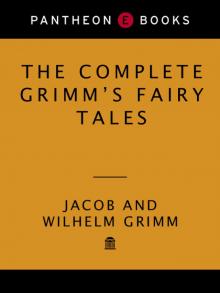 The Complete Grimm's Fairy Tales
The Complete Grimm's Fairy Tales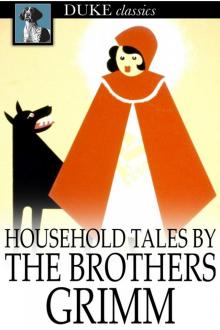 Household Tales by the Brothers Grimm
Household Tales by the Brothers Grimm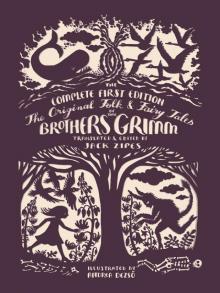 The Original Folk and Fairy Tales of the Brothers Grimm
The Original Folk and Fairy Tales of the Brothers Grimm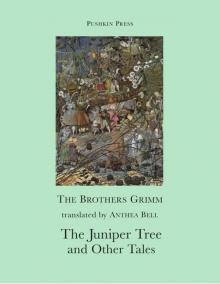 The Juniper Tree and Other Tales
The Juniper Tree and Other Tales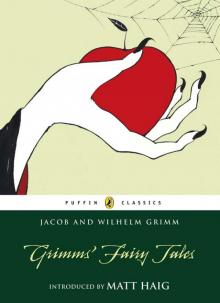 Grimms' Fairy Tales
Grimms' Fairy Tales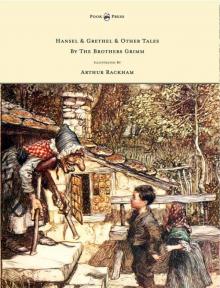 Hansel & Grethel - & Other Tales by the Brothers Grimm
Hansel & Grethel - & Other Tales by the Brothers Grimm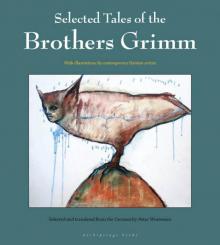 Selected Tales of the Brothers Grimm
Selected Tales of the Brothers Grimm